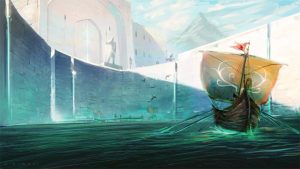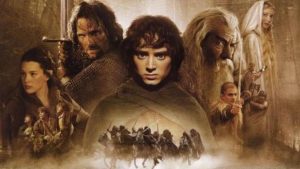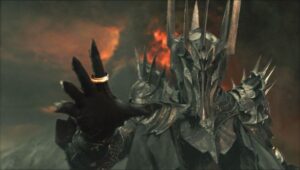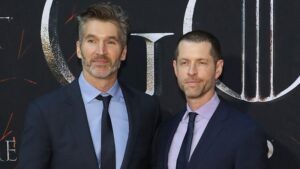For what is rumored to be the biggest, most expensive streaming series ever made, Amazon Prime Video’s The Lord Of The Rings prequel, based largely on the posthumously published works of author J.R.R. Tolkien, is barely even on the radar for most people. The series’ official social media accounts post cryptic messages and then go silent for weeks, even months. No cast members have been officially confirmed, even with filming set to begin in February of next year. We, the hardcore Tolkien fans, have to satisfy ourselves with theorizing and speculating about the smallest of details while we wait for any big announcements to break. But in the past couple of days, we’ve gotten plenty of small details, and now, at last, we have another big one.
Just a few days ago, a bunch of character code names for the series were released, with a couple of accompanying character traits that were largely vague and unhelpful. But last night Redanian Intelligence, a site better known for its coverage of The Witcher on Netflix, published transcripts of several audition tapes for some of these new characters, giving us a clearer insight into some of the series’ ensemble cast – specifically, the ones that seem most likely to be wholly invented, original characters designed by the showrunners themselves. And yes, that means it’s time to go through each audition tape one by one, breaking down all the new details and hints.
Obviously, be aware that any and all dialogue in an audition tape may not be indicative of the series’ actual script, and some of the scenarios within may not even be real: though a couple of them are detailed enough that they seem likely to be slightly altered versions of actual scenes from the show’s first season.

The first two videos focus on the character of Brac. I had previously speculated that Brac, described as “irascible and cantankerous”, might be the Elven King Oropher, lord of the Wood Elves of Greenwood and best/only known for leading his troops in a reckless charge against the forces of Sauron and dying in the process. Turns out, I was far off the mark in this case: based on the clues provided in these two videos, it appears that Brac is a human man. In Tolkien’s mythos, there are many different kinds of humans inhabiting the earth during the Second Age when this series takes place – but for the purposes of this post, I’m only going to be focusing on two, in particular: the Men of the West, who lived on the island of Númenór, and the Drúedain, or “Wild Men”, who lived in Middle-earth but were permitted to travel whither they wished. And Brac is almost definitely one of the latter.
The first video revolves around Brac’s interactions with an unnamed second person who appears to have come from the royal court of Númenór to consult with him about some urgent, mysterious matter. It is clear from context that Brac is living or staying in Númenór, as a guest of the royalty: specifically, Brac references “your queen”, indicating that his storyline takes place during the reign of one of the three ruling queens of Númenór – most likely Tar-Ancalimë. In Tolkien’s writings, one of the most major events involving the Drúedain takes place during her reign: it was at that time that the Drúedain who lived in Númenór became afraid and began to return across the sea to Middle-earth, realizing in their hearts that doom was coming for the mighty island kingdom, and any who stayed there would be swallowed up in the bloodbath to come.
Brac appears to be a high-ranking member of Drúedain nobility, who is pondering whether to stay on the island or return home. He questions the queen’s messenger, demanding to know the real reason why a Númenórean queen, whose people colonized and “befouled” Brac’s homeland, would suddenly pretend to care about her subjects’ suffering. The messenger gives no clear answer. The scene ends with Brac reluctantly allowing the messenger to spend the night at his house.
In the next scene, it is made obvious that the setting is Númenór, as Brac comments angrily about how much he despises the night sky made bright as noon-day by the lights of the island’s cities. “The night should be a blanket,” he announces, before prophetically adding “I can’t ever quite escape the feeling that it’s all about to fall over.” He announces his intention to leave the island and return to his homeland the very next day, but the second person, here given the name Radagar, pleads with him to stay, even revealing the queen’s bidding: “our people will make amends for each yield of crop you lost during our wars”. Brac appears to contemplate his words, but the scene ends shortly thereafter with no conclusion reached. Until we actually see the episode in which this conversation may or may not happen, we can only speculate about what Brac eventually chooses to do – will he leave the island or stay to negotiate with the queen? We know from Tolkien’s writings that there were no Drúedain still living in Númenór by the time of the island’s eventual downfall and destruction, so Brac will presumably escape death by godly wrath.
The next two scenes give us our first look at Kari, the “village healer with a secret”. I had hoped that her character might be Erendis, the Númenórean queen who raised her daughter, the aforementioned Tar-Ancalimë, in the countryside far from royal interference and male meddling – but unfortunately, it appears I was wrong. Kari seems to be a human, one of the proto-Dunlendings who lived in the regions colonized by Númenór in the Second Age and later reclaimed by nature. She is like Brac in that she is keenly aware of the divide between the peoples of Middle-earth, but unlike Brac, she doesn’t seem to have any intention of leaving her homeland.
In her first scene, Kari speaks to her lover, a soldier named Everad. There’s clearly a divide between these two tormented souls: Everad fears and distrusts Kari’s “disloyal” people, who rose in rebellion in “ages past”. Kari argues on behalf of her kinsfolk, and asks him whether there is “[any] room in your peoples hearts for forgiveness”. It doesn’t seem implausible that the steely Everad is a Númenórean warrior: if that is the case, then both characters are possibly committing a crime against their cultures by being together – and who doesn’t love some forbidden love? Considering that there aren’t any elf/human pairings in the Second Age, this seems like a good fit for the story.
The second scene with Kari is more tense and powerful: she wakes in the early morning and finds Everad already preparing to leave her home, while soldiers search for him in the village outside. There are a whole bunch of weirdly vague hints in this scene: Kari speaks of a “rumor”, and says that “few could” sleep during the night. As Everad prepares to leave her, Kari stops him: “If what you say is true, and this is the last time we are to see each other, please say what you want to say.” The scene ends with Kari telling Everad to wait for her: whether that’s meant literally or not is unclear.
Next, we have Loda: I predicted that Loda would be a boring character, and I’m beginning to think I’m right in that assumption. He’s a father who loves his daughter but doesn’t get along well with his son, who, in Loda’s words, is wasting “the most important years of his life on aimless schemes”. I don’t know about you, but that sounds like it could refer to the character of Aric, whom we met in a previous audition tape: roguish, charming, devious, remember him? Loda, on the other hand, is much more conventional and traditional: the scene opens with him prepping his daughter for her “first day as an apprentice”, and ends with him revealing that he’s…taken in a stowaway? That’s the most interesting part about his character so far, and yet we don’t have any clues to go on about who his stowaway is, or why she’s stowing away. Until we have more to go on, I’m guessing that Loda, like the others in this new batch of audition tapes, is a human – probably proto-Dunlending like Kari, though it’s not out of the question that his character is Drúedain.
Finally, we come to Hamsom. He only has one scene, but it reveals a great deal about his character: initially described as a “loving family man with health issues”, Hamsom is here seen working on his farm, trying to work past those very health issues: his wife tends to him, but wonders aloud whether Hamsom will survive the bitter winter. Her husband promises her that he’ll be there for her, reminding her of the strength of his love for her. He’s already one of the most charming characters in Amazon Prime’s ensemble cast, and I can’t wait to see more of him, though I have no idea how he’ll fit into a story about the creation of the Rings of Power, the downfall of Númenór, and the wars of the Last Alliance. I also don’t know if he’ll even live through the first season, in the condition he’s in. One thing we can surmise is that he is also human. I can’t determine yet which geographical region of Middle-earth he might be from, but his demeanor, and his hobbity name, almost suggest he might be a Halfling – Halflings, at this point in Middle-earth’s history, could only have dwelt in Wilderland, between the Misty Mountains and Greenwood the Great. But since that’s a bit of a stretch, I’m assuming he and his family are of the Race of Man, probably living somewhere in the north of Middle-earth, where the winter season would be particularly harsh.
It’s notable that Amazon Prime might be diving deep into Tolkien’s incredible genealogies for the human species, since Peter Jackson’s films only briefly touched on the idea that there are different groups of Men in Middle-earth – here, Amazon Prime has the opportunity to explore these different groups and subgroups of people, each with their own distinct cultures, customs and characters, from the Easterlings to the Woses (and hopefully, someday, the elusive Lossoth). It could lead to some very interesting – and probably heated – discussions about what it means to be human in Middle-earth, and what responsibilities and burdens go along with that distinction.
So there you go: four more characters, six more audition tapes, infinite questions and few answers. What do you think of this group of characters, and do you think any of them might be from Tolkien’s books, or are all of them newly invented by the team over at Amazon Prime? Share your thoughts, theories and opinions in the comments below!


